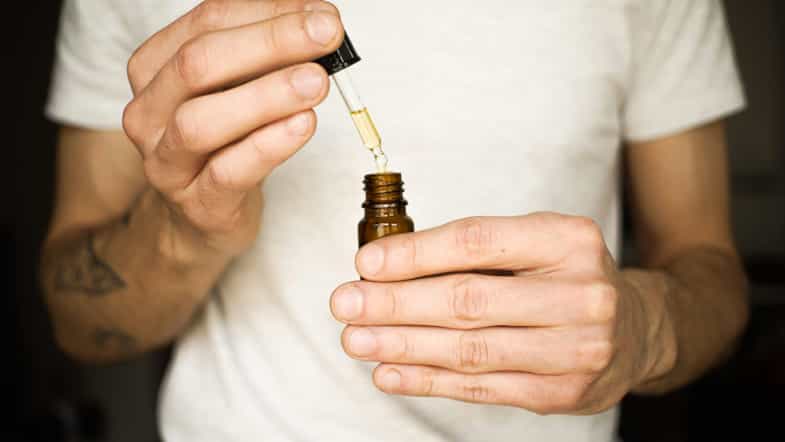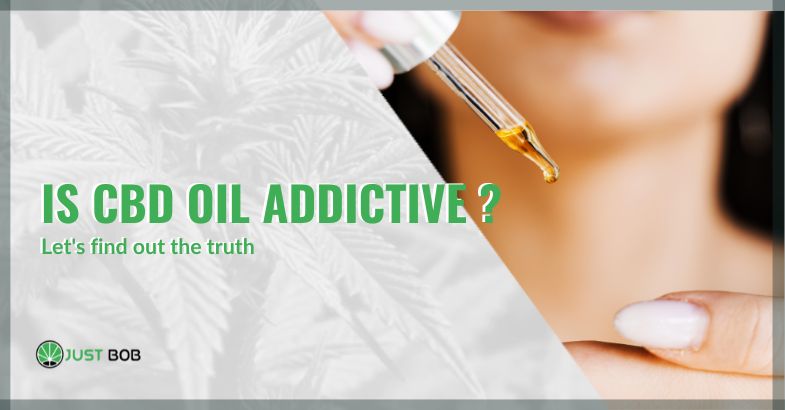Published on: 06/06/2024
Let’s find out the truth behind the false myth of CBD oil addiction
Here is a false myth that we will try to debunk and better understand: whether CBD oil is addictive to our bodies. People often believe that it leads to addiction probably because they associate it with cannabis.
Today we want to shed some light on this topic, to understand what an addiction is and how CBD works in our body in order to be able to answer once and for all the question, “Is CBD oil addictive?”
Let’s start.


What is CBD?
In recent years there has been a growing interest in the world related to CBD, which has captured the attention of millions of individuals around the world. This component of cannabis, extracted from the inflorescences of the sativa variety, has undergone painstaking exploration and analysis because of its wide range of potential benefits for individual health and well-being. Despite this, along with its growing popularity, another question has arisen that deserves careful consideration: is CBD addictive?
CBD, or cannabidiol, represents one of the many chemical compounds synthesized by the cannabis plant. Unlike THC, tetrahydrocannabinol, or the active ingredient in marijuana that induces the psychoactive effects, cannabidiol does not generate any such effects.
More and more people are using CBD and its derivatives, such as the oil of the same name, for example, precisely because they are able to benefit from its positive effects and countless properties without any kind of “high” being generated on the body.
Thus we have cannabidiol being used as an anti-inflammatory, natural analgesic and pain reliever. Used by multiple sclerosis sufferers to counteract the symptomatic muscle spasms of the disease and again, it is in use in those who suffer from anxiety attacks or are particularly stressed.
Cannabidiol offers calming and relaxing benefits for our bodies. Did you know that CBD is used as a natural remedy by those who suffer from insomnia? In short, there are many and varied channels of cannabidiol use.
The potential therapeutic properties of CBD are increasingly widespread, regulated differently in different countries around the world, but the trend is for increasing use of cannabidiol precisely as an alternative and substitute to traditional medicines.
How does cannabidiol act in our bodies?
Cannabidiol (CBD) interacts with our body through the endocannabinoid system, a complex signaling system found in the human body responsible for several vital functions.
The endocannabinoid system plays a leading role in regulating a wide range of physiological functions, including sleep, appetite, mood, pain, and more. CBD acts mainly by affecting the receptors of the endocannabinoid system, known as CB1 and CB2 receptors.
However, unlike tetrahydrocannabinol, the cousin capable of generating the “high” in our bodies, CBD does not bind directly and intensively to CB1 and CB2 receptors as THC does. In fact, it appears to modulate the activity of these receptors and indirectly influence other signaling systems in the body.
For example, CBD is known to block the enzyme FAAH, which degrades anandamide, an endocannabinoid naturally produced by the human body that helps regulate mood, sleep, and more. In doing so, CBD can potentially increase anandamide levels in the body, enhancing the beneficial effects.
In addition, CBD has been associated with increasing endocannabinoid levels in the body, which could contribute to its therapeutic effects. Overall, it appears that CBD has a positive impact on many physiological functions, contributing to the general well-being and health of the body.
Having clarified the nature of CBD and its impact on our body, let us now try to understand, to answer the central question of our article, what is an addiction.
Read also: How long does cbd oil take to work?
What is an addiction?
To understand whether CBD oil is addictive, it is appropriate to be clear on at least the basic concept of what an addiction is, without necessarily delving into the medical or chemical aspects.
Addiction is an extremely powerful state of mind, capable of altering both behavior and the brain’s sensations and responses to stimuli. Usually addiction, regardless of type, manifests itself in three stages:
- irresistible craving;
- loss of control after use;
- continued use over time.
When we take a substance or participate in a pleasurable activity, the brain releases a powerful substance: dopamine. This technically speaking, is not the problem: without it, we would not experience pleasure even in healthy activities, let alone less healthy ones.
What can happen is that the dopamine wave becomes so intense and strong that it creates a real communication breakdown between our pleasure center and the rational part of the brain. It can happen then, when an addiction is created, that instead of just enjoying theexperience we are having and then moving on, we go looking repeatedly for the source of pleasure.
Unfortunately, what happens when an addiction is created, in advanced stages, is the suppression of normal neurological processes in favor of the continuous use of substances that give us pleasure at the expense of what are the side effects (including those detrimental to the mental and physical health of our bodies).
From here now, two things need to be understood. The first is whether CBD oil can give this addiction and what, if any, are the side effects that can be generated in our body.


How does CBD oil work?
When we consume CBD oil, perhaps diluted in an herbal tea in the evening or a few sublingual drops throughout the day, it passes through the digestive system and the liver. Arriving here it is fragmented into smaller parts and spreads throughout the body via the bloodstream.
Here then is the substantial difference between CBD and addictive substances: cannabidiol does not create the typical “overload” found in addiction. In fact, it does not bind directly to the receptors (as we saw earlier) that catalyze dopamine release or otherwise affect the pleasure center. Rather, the CBD in the oil has an indirect, we might say holistic, effect. In fact, it encourages the production of endocannabinoids and associated enzymes, but does not overload the system.
Often, the uncertainty surrounding CBD oil is more due to the link that its main compound, cannabidiol, has with the cannabis family, having THC, another cannabinoid extracted from the plant, as a close relative.
In fact, we know that tetrahydrocannabinol has psychoactive effects and binds directly to receptors in the endocannabinoid system, affecting mood, appetite, concentration, motivation, and much more. Yes, THC has the potential to be addictive, although withdrawal symptoms are mild. Fortunately, CBD oil does not possess this receptor binding and interaction property, so not only is it unable to produce an intoxicating or euphoric effect, but it also does not generate addiction.
In 2018, the World Health Organization devoted special attention to the study and research on CBD, finding once again that it does not appear to pose risks of either abuse or addiction.
Moreover, again the WHO stated that it is well tolerated and safe to use for therapeutic purposes. CBD thus works with the body to promote its balance.
There then, we have given the answer to our basic question. Let us now understand and know what are the possible side effects to the use of CBD oil.
You can find CBD sativa oil and many other cannabidiol products on our online shop.
Read also: Are CBD buds legal in the UK?
Side effects of CBD oil use
Although CBD oil is generally considered safe for use it can sometimes cause side effects in some people, even if very mild. It is important to be aware and know what can happen.
Let’s look at the main ones below:
- dry mouth. You may experience the classic “cotton mouth” sensation, or the perception of dryness often accompanied by a reduction in salivary production after taking CBD oil;
- excessive sleep or related disturbances;
- changes in appetite or mood;
- various drug interactions. CBD oil, because it is metabolized by the liver, is easy to interact with other drugs;
- gastrointestinal disorders. We may experience nausea, diarrhea, or even abdominal cramps.
It is of paramount importance to point out that side effects from taking CBD oil can vary from person to person and depend on several factors, including dose, individual sensitivity as well as the quality of the product of which one makes his or her own.
In any case it is always advisable, not only a gradual use over time starting with low dosages, but the consultation of a doctor who knows our medical history and possible interactions with other drugs.
For this and other information to raise awareness towards the world of cannabis, stay tuned to Just bob.
Conclusions
In conclusion, the in-depth analysis of CBD oil has helped dispel the false myth of its alleged addiction. The research conducted confirmed its safety of use and the absence of potential risks related to abuse or addiction.
CBD, extracted from cannabis, acts in harmony with the human body, positively influencing the endocannabinoid system and promoting overall well-being. Unlike THC, cannabidiol is not addictive and does not induce psychoactive effects.
However, it is important to be aware of the possible side effects of CBD oil use, including dry mouth, sleep disturbances, changes in appetite and mood, drug interactions, and gastrointestinal disturbances. These effects, although generally mild, can vary from individual to individual and require attention and monitoring. Ultimately, CBD oil represents a promising therapeutic resource with a high safety profile, but it is important to use it responsibly and under the supervision of a medical professional.
Takeaways
- CBD, unlike THC, does not induce psychoactive effects or addiction. Understanding this crucial distinction helps dispel misconceptions about CBD oil addiction.
- CBD interacts with the endocannabinoid system, modulating receptors and influencing various physiological functions. Its indirect effects contribute to overall well-being without inducing addiction.
- Addiction involves three stages: craving, loss of control, and continued use. While substances like THC can lead to addiction by directly affecting pleasure centers, CBD does not bind intensively to these receptors, mitigating addictive potential.
- Extensive research, including the World Health Organization’s findings, confirms CBD’s safety and non-addictive nature. Its therapeutic benefits, coupled with a low risk of abuse or addiction, make it a promising option for various health conditions.
- While CBD oil is generally safe, users should be aware of potential side effects such as dry mouth, sleep disturbances, and gastrointestinal issues. Starting with low dosages and consulting a healthcare professional can help ensure safe and effective use.
FAQ
Is CBD oil addictive?
No, CBD oil is not addictive. Unlike THC, the psychoactive compound in marijuana, CBD does not induce addictive effects. It interacts with the endocannabinoid system in a way that promotes overall well-being without causing addiction.
How does CBD oil work?
CBD oil engages with the human body’s endocannabinoid system, adjusting receptors and impacting a range of bodily functions including sleep, hunger, emotional state, and sensation of pain. Differing from substances that can lead to addiction, CBD avoids overwhelming this system and does not directly connect with centers of pleasure.
What are the side effects of CBD oil use?
While CBD oil is generally considered safe, it can cause mild side effects in some individuals. These may include dry mouth, sleep disturbances, changes in appetite and mood, drug interactions, and gastrointestinal issues. It’s essential to start with low dosages and consult a healthcare professional.









